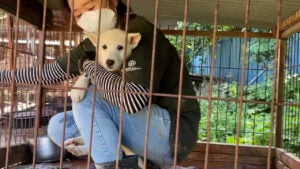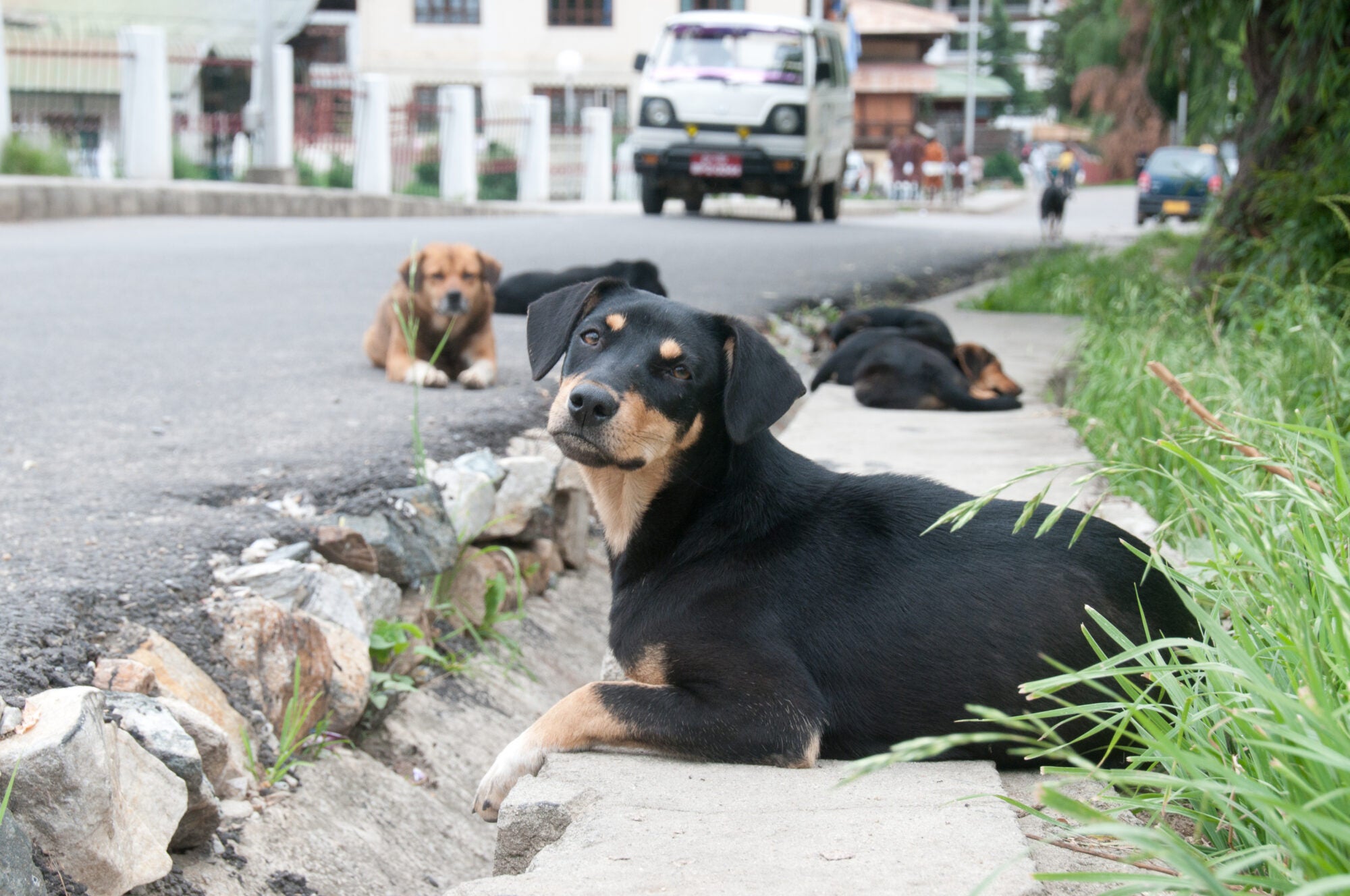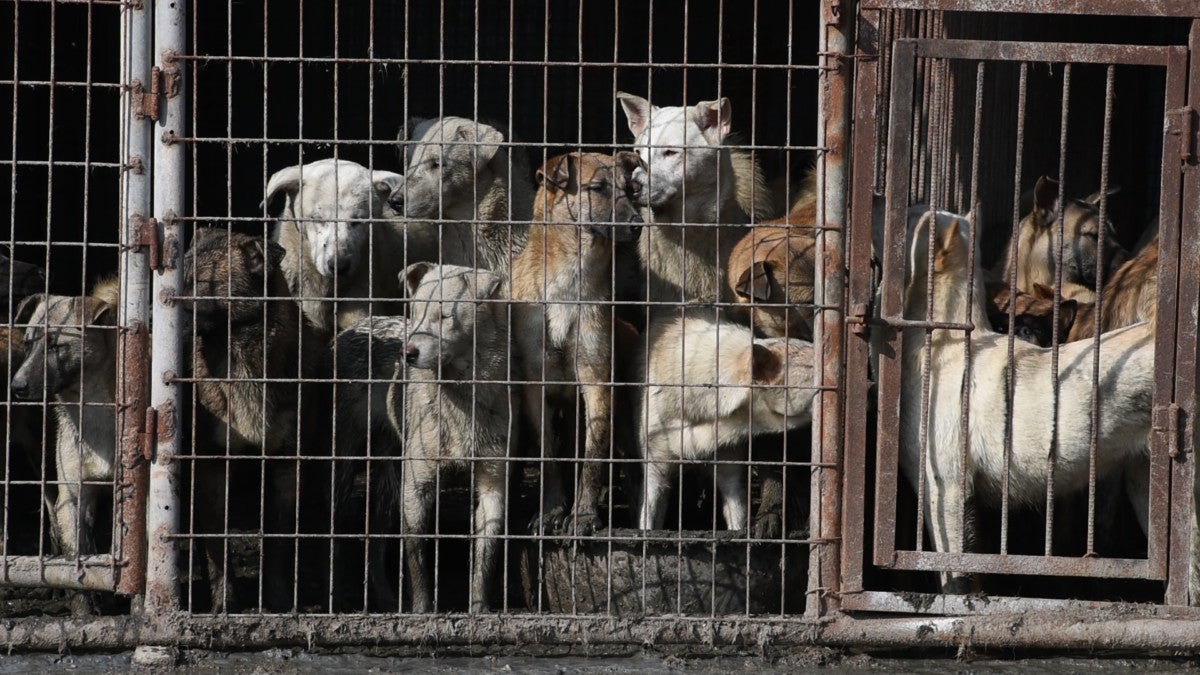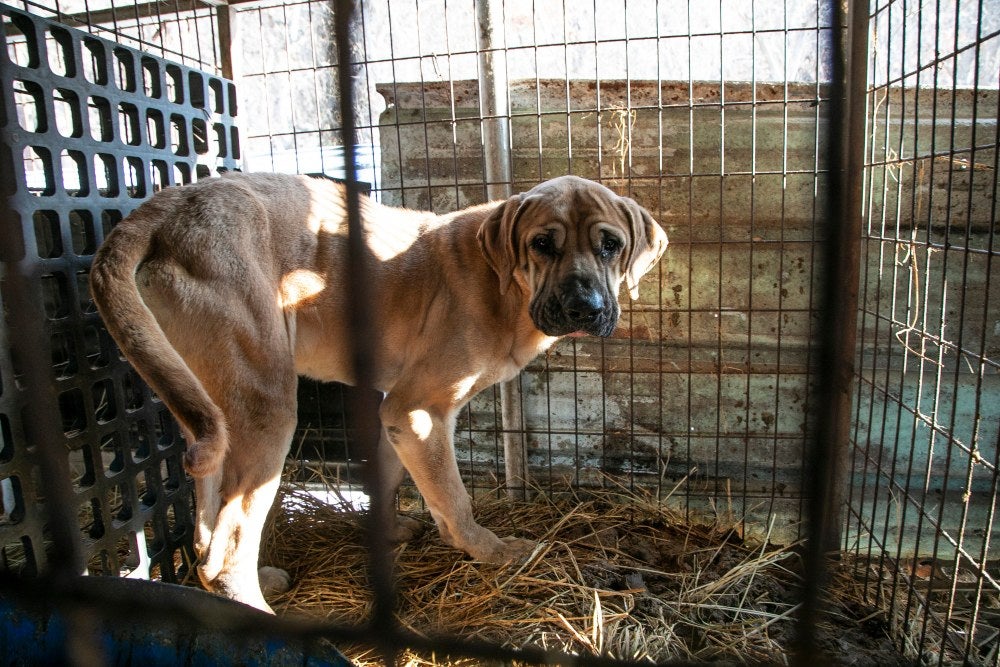
SEOUL—A dog meat farm on South Korea’s famous Jindo Island, which for more than 20 years bred and slaughtered Jindo dogs for human consumption despite them being the country’s national dog breed, has closed its doors for good after coming to an agreement with Humane Society International/Korea and Korean animal protection group LIFE. The 66 year-old dog farmer Mr Kim, who also runs a local restaurant where his dogs were on the menu, was found by local authorities to have breached the Animal Protection Act by killing dogs in front of each other, after concerned residents reported hearing dogs vocalising in terror on the farm. Instead of setting up business elsewhere, the farmer signed a contract with LIFE to give up dog farming forever and agreed to remove dog meat from the menu at his restaurant.
During the rescue, one of the dogs was found to have a microchip confirming that she is a pure bred Jindo officially registered as a “Natural Monument” under the name Jinju meaning “pearl.” The South Korean government designated the Jindo the country’s 53rd Natural Monument in 1962, nominally affording them protection under the Cultural Heritage Protection Act, meaning the farmer could face additional charges.
LIFE and HSI/Korea saved all 65 Jindo dogs and puppies found languishing in small, wire battery cages on the farm. Their fate would have been to be killed by electrocution and butchered for dog meat, and the rescuers were horrified to discover a large pile of collars in the killing area of the farm, each representing a dog who lost their life to the brutal industry. Humane Society International/Korea, which has closed down 17 other dog meat farms in the country, is campaigning for legislation in South Korea to end the dog meat industry.
Nara Kim, HSI/Korea’s campaign manager, said: “All the dogs on this meat farm are Jindos which is supposed to be Korea’s national dog breed. But instead, these poor dogs have been locked away in filthy wire cages, fed on restaurant waste, denied even the most basic care and any level of human kindness. As a proud Korean I always find it upsetting to see the cruelty of dog meat farms, but it felt especially shocking to see our country’s national dog breed being exploited like this on Jindo Island. I shed tears when I saw the killing area where I know dogs were killed in front of each other. There was a big pile of collars where they were electrocuted. Thankfully, together with our friends at LIFE, we have been able to get these dogs out of that horrible place and ensure that no animals will ever suffer again in those cages. The authorities will also pursue cruelty charges against the farmer. As the Animal Protection Act currently offers little protection for dogs on dog meat farms, it’s encouraging to see law enforcement officials making use of those few regulations at their disposal. But in order to fully crack down on this brutal industry, we will continue to campaign for a ban on the breeding, slaughter and sale of dogs for meat.”
In-Seob Sim, president of LIFE, said: “I feel anger beyond misery. We boast about Jindo dogs being our national dog, but at the same time they are on someone’s dinner table. This is a direct example of the duality of humans, but also of the contradiction in Korean society. Is there really a difference between a treasure Jindo dog and an edible Jindo dog as the dog meat traders encourage us to think? The answer is no. They are both just Jindo dogs, almost perfect pets for companionship with people.”
The rescue follows the close of the Boknal summer season in South Korea which ended on 10 August, a time when dog meat soup or “bosintang” is most often eaten, and when hundreds of thousands of dogs bred for meat on factory farms across the country are killed. Although opinion polls show that most Koreans (84%) don’t eat dog meat, of those Koreans who do eat it, 70% consume it over Boknal, in the belief that it can help relieve the effects of the sweltering summer heat.
During this year’s Boknal, HSI/Korea teamed up with vegan chefs and restaurants Baek-rin Ahn, Nammi Plant Lab, and Jung-won Park (Haru Vegan) to encourage consumers to swap dog meat soup for delicious plant-based recipes instead. Each chef devised a fresh, plant-based take on Boknal eating, incorporating many of the ingredients traditionally found in bosintang.
The dog farm rescue by LIFE and HSI/Korea follows last month’s announcement by the Ministry of Justice that an amendment will be made to article 82 of the Civil Law to grant animals legal status, stating “animals are not objects”. Humane Society International/Korea welcomes this proposal but says the deplorable conditions on this latest dog meat farm demonstrate how vital it is that the amended law brings about an end to the cruel dog meat industry.
Nara Kim says: “With the law set to change in South Korea to grant animals legal status as individuals with lives that deserve to be protected, I hope that the time has finally come for all dog meat farms here to close their doors for good.”
Humane Society International/Korea has rescued more than 2,500 dogs from certain death from 17 dog farms, who now live with families in the United States, Canada and the United Kingdom. The 65 Jindos from this latest rescue will now receive emergency veterinary care at a partner shelter in South Korea where they will also receive care and nutritious food while they undergo the vaccinations and medical tests required for overseas travel. Once they’re fit to fly, and COVID-19 restrictions allowing, HSI will fly the dogs to North America where they will begin their search for adoptive homes.
Facts:
- An estimated 1 to 2 million dogs are kept on thousands of farms across South Korea.
- Alongside Jindos and mastiffs typically bred for meat, many dog farms also breed Labradors, golden retrievers, spaniels, huskies, beagles and other breeds.
- In 1962, the South Korean government designated the Jindo the country’s 53rd Natural Monument, nominally affording them protection under the Cultural Heritage Protection Act.
- Most South Koreans do not consume dog meat, and a growing population see dogs only as companion animals. According to the Ministry of Agriculture, Food and Rural Affairs (MAFRA), an estimated 6.38 million South Korean households lived with companion animals in 2020, equating to 28% of households.
- In recent years, there have been a series of crackdowns by authorities to curb the dog meat industry include the shutting down of Taepyeong dog slaughterhouse (the country’s largest) by Seongnam City Council in November 2018, followed in July 2019 by the closure of Gupo dog meat market in Busan, and a declaration in October that year by the mayor of Seoul that the capital city is “dog slaughter free”.
- This farm closure was conducted under COVID-19 health and safety restrictions. A veterinarian tests for the presence of the H3N2 virus (“canine influenza”) at the time the dogs receive their rabies, distemper, hepatitis, parvo virus, parainfluenza and Leptospira vaccines. The dogs will be quarantined for at least 30 days and health certified again prior to transport overseas, in accordance with international export and import requirements.
Download Photos/Video of the Rescue
ENDS
Media Contact:
- South Korea: Nara Kim: nkim@hsi.org
- United Kingdom: Wendy Higgins: whiggins@hsi.org



